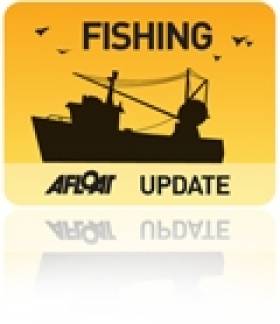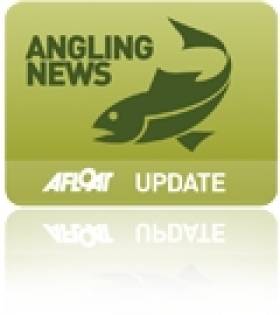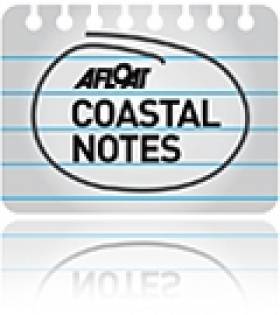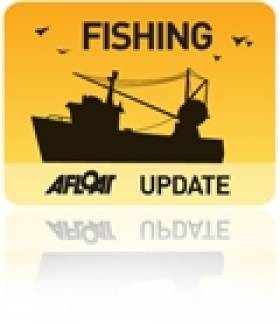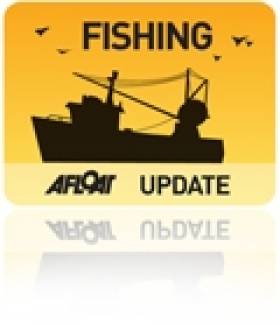Displaying items by tag: prawn
€123 million Package of Quotas for Whitefish Fishermen, Increase of 3% in €60m Prawn Quota
#whitefish – Following 48 hours of intensive negotiations the Minister for the Marine, Simon Coveney T.D., said tonight that he was relieved that he had successfully managed to turn an extremely worrying proposal from the European Commission into a much improved outcome for the Irish whitefish industry.
The Minister said "The total €123m value of quotas secured for the whitefish fishermen amounts to a small increase from last year. This is a good result overall and is a long way from the original Commission proposals which would have resulted in very significant losses to our fleet". The original Commission proposal included a 20% reduction in whitefish quotas, involving a direct income reduction of €18m for our fishermen.
The Minster said "I am particularly pleased to have persuaded the Commission to reverse the proposed 14% cut in the prawn quota, the most important fishery for the whitefish fleet. We succeeded in getting the Commission to follow the scientific advice for prawns and apply a 3% increase in our quota for this extremely important €60m fishery. This was my number one priority heading into these negotiations and it took a lot of effort to convince the Commission of the merits of our arguments. I have also secured an 11% increase in the important hake fishery and maintained quotas for the economically important monkfish and megrim stocks. This involves a total landing value of €27million to the whitefish fleet operating in the Celtic Sea."
Other details negotiated include;
In the North West, a 20% increase in monkfish quota; a minor increase for the megrim quota, a doubling of the Rockall haddock quota and a 14 % increase in Donegal haddock for the ports of Greencastle and Killybegs
For the South and West coasts and the Irish Sea, a 3% increase in the €60 million prawn fishery which benefits the ports of Clogherhead, Howth, Union Hall, Castletownbere, Dingle and Ros a Mhil.
For the South West, a 11% increase in hake, no change in monkfish and megrim which together provide for a € 27m fishery, mainly important for the southern ports of Castletownbere and Dingle;
For the mixed whitefish fisheries off the South and West coasts, a 12 % reduction in haddock (down from a 41% proposed cut); a 13% cut in cod (reduced from the 64% proposed cut) and 12% reduction in whiting (from a proposed 14% cut).
The Minister explained "The most difficult area coming into these negotiations was the Commission proposal for cod, haddock and whiting in the Celtic Sea. I successfully resisted very substantial cuts in cod and haddock quotas following extremely difficult negotiations. We were able to bring to the table an Irish industry initiative to introduce new fishing gear in 2015 that will allow more young fish to escape and this assisted me greatly in getting the proposed severe cuts (-64% Cod and -41% Haddock) brought down to more manageable levels. This important initiative, it is estimated, will reduce discards of haddock and whiting in the Celtic Sea by some 4,000 tonnes each year - a 30% reduction in total discards of these stocks. It will assist greatly in providing a solid basis for the growth of these fish stocks in the Celtic Sea and should support quota increases in the coming years and the fishing industry should be commended for their initiative."
The Minister concluded "the package agreed for whitefish quotas for Irish fishermen in 2015 represents a successful outcome considering the depth of cuts proposed by the Commission at the start of these Council negotiations. We can face into 2015 having secured an increase for our vitally important prawn fishery and stability for many of our valuable stocks around our coast. This is a good outcome for the fishing industry and it also supports a sustainable approach to protecting our fish stocks"
New Angling Guides and Salmon Bait Restrictions
#Angling - Inland Fisheries Ireland has recently added two new guides to its list of resources for anglers fishing in Ireland.
The West of Ireland Sea Angling Guide covers the region from Westport, in Clew Bay, south to the rocky headlands of North Clare, including Galway Bay, Connemara, Killary, Louisburgh, Clew Bay, and the offshore islands of Inisbofin, Inisturk and the Aran Islands.
The guide is in no way comprehensive, and the list of marks and venues is just a sample of what is available across the region's waterways. There are literally hundreds of shore marks in the region that have rarely, if ever, been fished, but the potential waiting to be explored is immense. Getting off the beaten path and trying a new mark may produce the fish of a lifetime.
In addition, the County Sligo Game Angling Guide covers the main game angling waters in the district. It contains information on the location of each fishery as well as details in relation to contacts, permitted angling methods, angling seasons, etc.
Meanwhile, IFI has received numerous submissions from individual anglers, angling organisations and angling tourist providers regarding restrictions on the use of prawn/shrimp as a salmon angling bait on the River Suir for the 2013 season.
IFI is interested to hear the views of other angling stakeholders or from those who wish to make further submissions.
Submissions can be made to IFI Clonmel by email at [email protected] or by post to Inland Fisheries Ireland, Anglesea Street, Clonmel, Co Tipperary.
The closing date for receipt of submissions is 28 February 2013.
Meeting for Bantry Bay Fish Farm Opponents Tonight
#COASTAL NOTES - Bantry Bay has reached its capacity for salmon farming, says the committee formed to oppose a proposed new facility at Shot Head.
Save Bantry Bay has called a public meeting for supporters tonight (24 March) at Eccles Hotel in Glengarrif, Co Cork, starting at 8.15pm - where chairman Kieran O'Shea will give a presentation on the group's "wide-ranging objections", as The Fish Site reports.
Minister for the Marine Simon Coveney is currently considering the licence application for Marine Harvet's proposed salmon farm at Shot Head in Adrigole.
Concerns among the committee's members include the potential spoiling of the area's natural beauty having a knock-on effect on tourism, and the environmental consequences of algae blooms from nitrogen and phosphorous waste.
Local fisherman fear that a fish farm of more than 100 acres would see the closing off of part of an "important ground for shrimp and prawn".
Possible infection of wild salmon in local river systems by sea lice from farmed salmon is also an issue, with the Environmental Impact Statement for Shot Head highlighting an outbreak of lice at Marine Harvest's facility in Roancarrig two years ago.
The Fish Site has more on the story HERE.
- Coastal Notes
- Fishing
- Bantry Bay
- Co Cork
- fish farm
- salmon farm
- Shot Head
- Adrigole
- Glengarrif
- Eccles Hotel
- Save Bantry Bay
- Minister for the Marine
- Simon Coveney
- Marine Harvest
- tourism
- environment
- algae blooms
- nitrogen
- phosphorous
- waste
- shrimp
- prawn
- infection
- Wild Salmon
- sea lice
- environmental impact statement
- Roancarrigh
Cumbrians Urged to Try New Fish to Save Irish Sea Stocks
#FISHING - Seafood lovers of Cumbria in north-west England have been urged to broaden their tastes to save depleted stocks of their favourite fish in the Irish Sea.
According to the News & Star, some 80% of Britons "insist upon eating just five types of fish – cod, tuna, salmon, prawn and haddock."
But the Cumbria Wildlife Trust says that with coastal waters facing the serious threat of overfishing, a rethink is needed among both consumers and suppliers alike.
“The Irish Sea has a wide range of edible fish species but you wouldn’t know it judging by the fish counters in supermarkets across the county," says Lindsay Sullivan of the trust's Wild Oceans project, an 18-month scheme that hopes to "turn the tide for seafood".
A big part of this is encouraging consumers to skip the usual white fish and try different species such as flounder, monkfish and red mulllet, creating demand for cheaper and more sustainable fishing.
The News & Star has more on the story HERE.
Ireland Catches Record EU Fisheries Deal
#FISHERIES – There has been a record outcome for Ireland at EU Fisheries negotiations with a total Value of 2012 Fishing Opportunities of €250 million it was announced early this morning.
Following the conclusion of lengthy and complex EU fisheries negotiations the Minister for Agriculture, Food and the Marine, Simon Coveney TD, said "I am delighted at the outcome of these negotiations which delivered my key priorities and will allow the Irish fishing fleet to look forward to 2012 with optimism. The measures agreed in these negotiations will maximise employment and economic activity in our coastal communities." The Minister said that he had secured "141,000 tonnes of pelagic and tuna quotas and 36,000 tonnes of whitefish. I am satisfied that this will provide an excellent range of opportunities for our fishing industry in 2012."
Minister Coveney was speaking after three days of intensive negotiations, which concluded in the early hours of this morning. The Minister described the Council as "very challenging" and said that "my priority from the outset was to achieve an outcome that protected the Irish fishing industry while respecting the most up-to-date scientific data for priority stocks of critical importance to our fleets."
Mr Coveney described the reopening of the Irish Sea prawn fishery as "a very significant hard-won achievement, which will allow Irish fishing vessels to return to this important fishery immediately." This fishery had been closed in mid-October and was due to remain closed until 1 February 2012 but will now reopen after Minister Coveney secured additional fishing effort entitlements for the Irish fleet.
The Minister highlighted the agreement on total allowable catches (TACs) and quotas in 2012 on a number of species of particular economic importance to the Irish industry including the agreement to maintain quotas of prawns in the Irish Sea and off the south and south-west coasts. This fishery is estimated to be worth €52 million in 2012.
Mr Coveney said that "there is very good news for the fisheries along the south coast". The Irish quota for cod in the Celtic Sea is increasing by 77 per cent. He said that the Commission accepted the strong case he made for an increase in quotas for haddock and whiting in the Celtic Sea of 25 per cent and 15 per cent respectively which the Minister said "were entirely justified on the scientific data which I presented to the Commission." The original Commission
proposal was for a 25 per cent reduction in both stocks. The Minister said that the increases in these quotas would be worth an extra €3.5 to the south coast fishing industry. In addition, this morning's agreement ensures that quotas for Pollock and Saithe in the Celtic Sea will remain at existing levels next year. A very positive element in securing the future of these fisheries was the commitment to adopt new measures to reduce discarding of small fish in the Celtic Sea.
In addition, the Irish quota for Celtic Sea herring is increasing from 11,407 tonnes to 18,236 tonnes, a 60 per cent increase. "These are valuable quota increases and will support additional onshore employment in the processing industry." The Minister noted this increase was due to conservation measures in the Celtic Sea and responsible conservation management in recent years in partnership with the industry.
The Minister also negotiated a very significant increase in the Irish quota of 155 per cent for the spring Boarfish fishery off the south-west coast. This quota, which the Minister described as "a new and very exciting fishery" will increase from 22,227 tonnes to 56,666 tonnes.
There is a very significant increase of 200 per cent in the haddock quota off Donegal. There is also agreement that the Commission would bring forward new rules by the middle of February to assist catching of this greatly increased quota.
Mr Coveney recognised the position in relation to cod in the Irish Sea and accepted the proposal to reduce the TAC for 2012 by 25 per cent. "This approach is consistent with scientific advice and adherence with the Long Term Management Plan, which is designed to ensure that the stock recovers to sustainable levels in the future. This is vitally important from both an industry and conservation perspective."
The important €9 million quota for the Albocore Tuna summer fishery, off the south-west coast, has been increased by 342 tonnes to 3,896 tonnes for 2012. The Blue Whiting quota for the spring fishery, off the north-west coast, has increased from 1,187 tonnes this year to 7,498 tonnes for 2012.
From the outset of the negotiations an absolute priority for Ireland was the satisfactory application of the Hague Preferences, which are of crucial, political economic importance for this country and have been successfully protected.
Finally, Mr Coveney said he was satisfied that Ireland had achieved what was necessary in this year's negotiations to provide significant opportunities for the fishing industry and coastal communities around the country and will protect our fishing stocks for future sustainability.



























